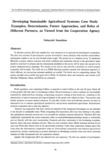Developing Sustainable Agricultural Systems: Case Study Examples, Determinants, Future Approaches, and Roles of Different Partners, as Viewed from the Cooperation Agency
JIRCAS international symposium series
| ISSN | 13406108 |
|---|---|
| NII recode ID (NCID) | AA1100908X |

Full text
intlsymp-9_99-106.pdf332.71 KB
To alleviate poverty, JICA has adopted four new measures in its agricultural development cooperation. The first one consists of participatory project formulation. Issue analysis with broader stakeholders' participation enables to set up more focused project target. The second one is a baseline survey. To implement effectively a project, natural, economic and social conditions and constraints relevant to the agricultural target should be examined in advance and the determinants identified in the survey will be taken into account in the project implementation planning. The results of the survey also provide a platform on which project evaluation will be made. The third one is a FSR/E (farming systems research and extension) approach in which efficient, yet cost-saving extension methods are studied. The fourth one is a supporting system. The system includes micro-credits and grant aid to NGOs. To illustrate these new measures, case studies in El Salvador, Philippines, Ghana, and Bolivia are presented.
| Creator | Nobuyuki Samejima |
|---|---|
| Publisher | Japan International Research Center for Agricultural Sciences |
| Available Online | |
| Issue | 9 |
| spage | 99 |
| epage | 106 |
| Language | eng |
